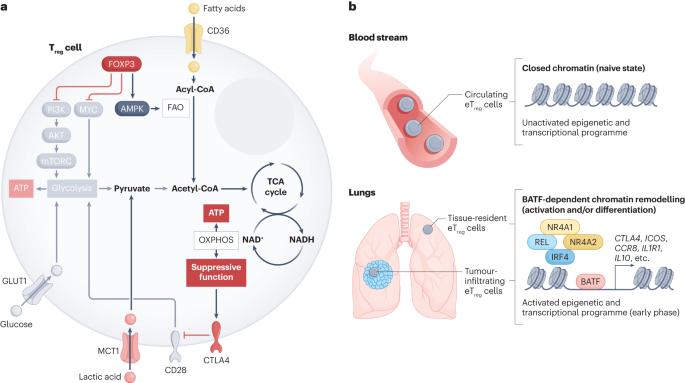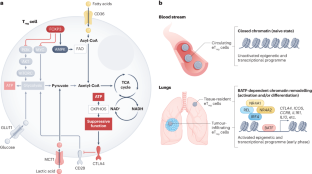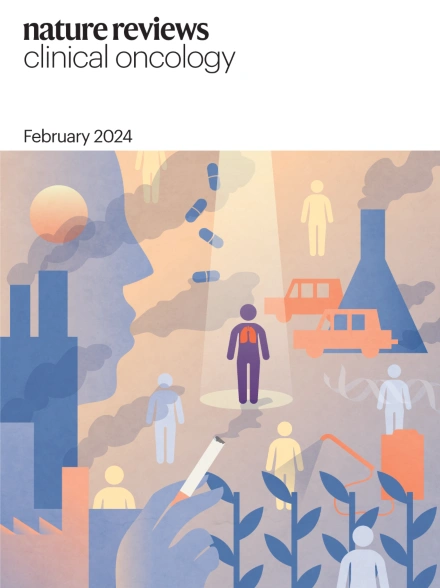Regulatory T cell-mediated immunosuppression orchestrated by cancer: towards an immuno-genomic paradigm for precision medicine
IF 81.1
1区 医学
Q1 ONCOLOGY
引用次数: 0
Abstract
Accumulating evidence indicates that aberrant signalling stemming from genetic abnormalities in cancer cells has a fundamental role in their evasion of antitumour immunity. Immune escape mechanisms include enhanced expression of immunosuppressive molecules, such as immune-checkpoint proteins, and the accumulation of immunosuppressive cells, including regulatory T (Treg) cells, in the tumour microenvironment. Therefore, Treg cells are key targets for cancer immunotherapy. Given that therapies targeting molecules predominantly expressed by Treg cells, such as CD25 or GITR, have thus far had limited antitumour efficacy, elucidating how certain characteristics of cancer, particularly genetic abnormalities, influence Treg cells is necessary to develop novel immunotherapeutic strategies. Hence, Treg cell-targeted strategies based on the particular characteristics of cancer in each patient, such as the combination of immune-checkpoint inhibitors with molecularly targeted agents that disrupt the immunosuppressive networks mediating Treg cell recruitment and/or activation, could become a new paradigm of cancer therapy. In this Review, we discuss new insights on the mechanisms by which cancers generate immunosuppressive networks that attenuate antitumour immunity and how these networks confer resistance to cancer immunotherapy, with a focus on Treg cells. These insights lead us to propose the concept of ‘immuno-genomic precision medicine’ based on specific characteristics of cancer, especially genetic profiles, that correlate with particular mechanisms of tumour immune escape and might, therefore, inform the optimal choice of immunotherapy for individual patients. Increasing evidence indicates that signalling networks activated downstream of oncogenic alterations contribute fundamentally to cancer immune evasion, including by promoting the accumulation of regulatory T (Treg) cells and other immunosuppressive cells in the tumour microenvironment (TME). Herein, the authors discuss the mechanisms via which cancers engage Treg cells to evade antitumour immunity, as well as the characteristics of Treg cells in the TME and their roles in resistance to immune-checkpoint inhibitors. Considering these aspects, they propose the concept of ‘immuno-genomic cancer evolution’ for tumorigenesis and the related paradigm of ‘immuno-genomic precision medicine’, postulating that the specific characteristics of cancer, especially genetic profiles that correlate with particular immunosuppressive networks in the TME, are likely to inform individualized strategies for combining molecularly targeted agents with immunotherapies.


由癌症协调的调节性 T 细胞介导的免疫抑制:迈向精准医疗的免疫基因组范式。
越来越多的证据表明,癌细胞基因异常产生的异常信号在逃避抗肿瘤免疫方面起着根本性的作用。免疫逃逸机制包括增强免疫抑制分子(如免疫检查点蛋白)的表达,以及免疫抑制细胞(包括调节性 T(Treg)细胞)在肿瘤微环境中的聚集。因此,Treg 细胞是癌症免疫疗法的关键靶点。鉴于针对主要由 Treg 细胞表达的分子(如 CD25 或 GITR)的疗法迄今为止抗肿瘤效果有限,阐明癌症的某些特征(尤其是基因异常)如何影响 Treg 细胞对于开发新型免疫疗法策略十分必要。因此,根据每位患者癌症的具体特征制定Treg细胞靶向策略,如将免疫检查点抑制剂与分子靶向药物相结合,破坏介导Treg细胞招募和/或激活的免疫抑制网络,可能成为癌症治疗的新模式。在这篇综述中,我们将讨论癌症产生削弱抗肿瘤免疫力的免疫抑制网络的机制,以及这些网络如何赋予癌症免疫疗法抗药性的新见解,重点是 Treg 细胞。这些见解使我们提出了 "免疫基因组精准医学 "的概念,这一概念基于癌症的特定特征,尤其是基因特征,这些特征与肿瘤免疫逃逸的特定机制相关,因此可为个体患者选择最佳免疫疗法提供依据。
本文章由计算机程序翻译,如有差异,请以英文原文为准。
求助全文
约1分钟内获得全文
求助全文
来源期刊
CiteScore
99.40
自引率
0.40%
发文量
114
审稿时长
6-12 weeks
期刊介绍:
Nature Reviews publishes clinical content authored by internationally renowned clinical academics and researchers, catering to readers in the medical sciences at postgraduate levels and beyond. Although targeted at practicing doctors, researchers, and academics within specific specialties, the aim is to ensure accessibility for readers across various medical disciplines. The journal features in-depth Reviews offering authoritative and current information, contextualizing topics within the history and development of a field. Perspectives, News & Views articles, and the Research Highlights section provide topical discussions, opinions, and filtered primary research from diverse medical journals.

 求助内容:
求助内容: 应助结果提醒方式:
应助结果提醒方式:


